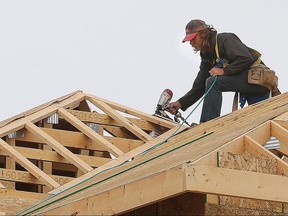
Article content
Mayor Scott Gillingham made an ambitious claim that he wanted 8,000 new residences built in Winnipeg this year. We’ve heard different stories and claims that the city is on track to hit that ambitious goal of 8,000 new residences and that Winnipeg housing starts are up. However, the Canada Mortgage and Housing Corporation (CMHC) numbers tell us something entirely different. According to newly released data, single housing starts in Winnipeg are down 23%. Only three other major cities — Victoria, Vancouver, and Hamilton — are worse.
Advertisement 2
Story continues below
Article content
But the news doesn’t stop there. All other housing starts in Winnipeg are down a staggering 81%, a figure unmatched by any other major city in Canada. To put this in perspective, Saskatoon is down 74%, and London, Ont., is down 50%. Overall, the CMHC states that total housing, including single-detached and all other types, has decreased by 67% in Winnipeg. Only two other metropolitan areas in Canada with populations greater than 10,000 have seen greater decreases: Brantford at -80% and Kitchener-Cambridge-Waterloo at -69%.
When we look at the provincial level, Manitoba stands out, but not in a good way. Compared to all other provinces, Manitoba has experienced the most significant decrease in all housing starts over the last 12 months, down 62%. Saskatchewan is the only other province with a decrease, at just 20%.
Article content
Advertisement 3
Story continues below
Article content
This bleak picture indicates that we have more work to do to eliminate the bureaucracy in Winnipeg. Three major projects have been delayed, and had they been approved already, the city would have surpassed the goal of 8,000 new residences. The most recent news involves the Lemay Forest development, Parker Lands, and the Water Tower district. These are just a few examples of the potential developments that could have significantly boosted our housing numbers.
Justin Zarnowski of Shindico told the Winnipeg Sun, “The rising interest rate environment and increasing construction costs have made it much harder to develop new housing in Winnipeg. The City of Winnipeg has announced several new programs to reduce red tape in rezoning sites. Shindico participated in the Malls and Corridors review where zoning as a right for existing shopping centres and properties on major corridors is being implemented. These changes, if done well, would definitely increase the number of multifamily starts in Winnipeg. We look forward to the City following through on these programs as Shindico has thousands of units that can be built in all corners of the city.”
Advertisement 4
Story continues below
Article content
I don’t want to beat up on the system, but we know there is a problem, and we’ve had it for decades. The evidence shows that delays impact you and me because costs increase as time passes, resulting in higher prices for homes that are passed on to the public. This is an economic issue and, as such, needs a new approach.
I spoke with John Wintrup, a former member of the City of Winnipeg Planning Department, and asked him what faster service would mean. He said, “it would stop the economic hurt and the social pain in our community and reverse Winnipeg’s free fall into decay.”
I urge the city and province to view development as an investment. A busy development sector provides jobs that have significant ripple effects on our economy. More development would lower the supply and demand pricing factors that are currently increasing the cost of housing in Winnipeg.
Advertisement 5
Story continues below
Article content
“Changing the system now will stop wasting people’s time, energy, and dollars spent on persistent legal conflicts and instead channel more resources toward building better neighbourhoods, communities, and cities. Instilling a culture of customer service, changing the ‘Administration’ back into the ‘Public Service’, from the Us [City Staff] vs. Them [property owners] to simply treating everyone fairly, honestly and reasonably,” said Wintrup
It is an economic issue and opportunity, and as such the City of Winnipeg and the Province of Manitoba need to invest more money, time and effort into improving the planning and permitting immediately. They should hire more staff to improve the speed and customer service levels. Introduce an express lane for multi-family developments, which are most needed in our community.
Advertisement 6
Story continues below
Article content
I think the City of Winnipeg should remove planning decisions from elected officials. Establish a Planning Commission that understands the issues and can develop a process that benefits developers will ultimately benefit you and me with lower prices and an increased supply, ensuring prices remain reasonable.
Most city councillors have been in office for years, and they have issues with planning and permitting. They need to show leadership, check their egos at the door, and bring in the professionals who will make the necessary changes for our city to grow efficiently.
Making these changes and investments today to improve the planning and permitting services will pay dividends in the future; imagine 8,000 more homes paying property taxes.
Planning issues, customer service complaints, and delays are nothing new at Winnipeg City Hall. The situation is bad, but it’s not irreversible. With the right approach and a commitment to making the necessary changes, Winnipeg can turn this housing crisis around and pave the way for a prosperous future. Let’s hold our leaders accountable and push for the reforms that will make our city a better place to live for everyone.
— Kevin Klein is a former Tory cabinet minister, a former city councillor and is the President & CEO of Klein Group Ltd.
Article content
Comments